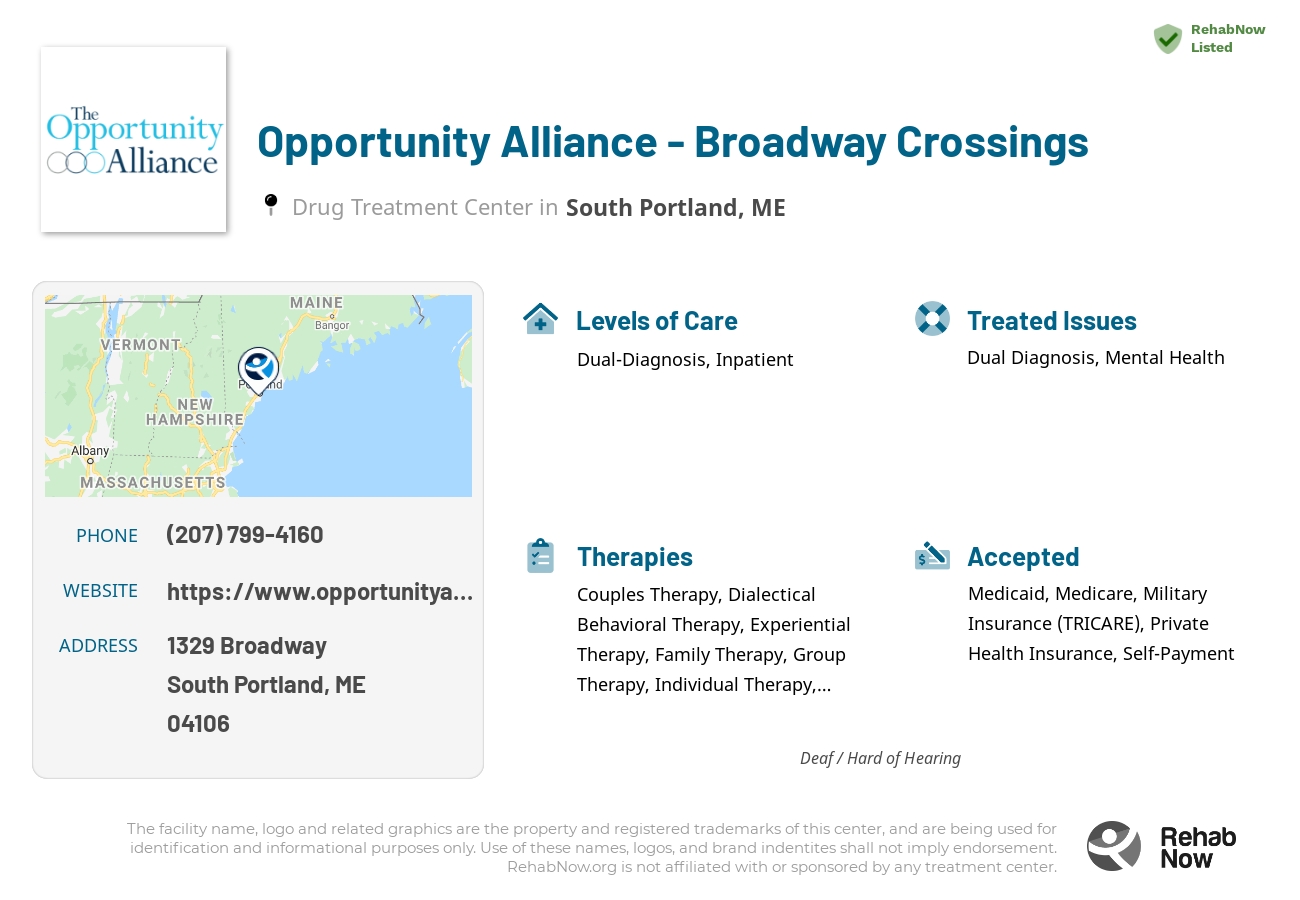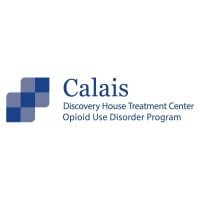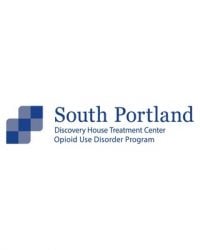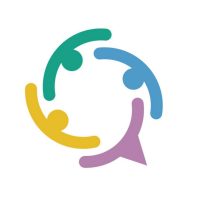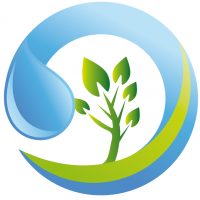Opportunity Alliance - Broadway Crossings
Drug Rehab Center in South Portland, Maine
Opportunity Alliance - Broadway Crossings in South Portland, Maine is an accredited addiction treatment facility that specializes in treating individuals with Dual Diagnosis, Mental Health issues, Alcoholism, Drug Addiction, and Substance Abuse, offering a range of levels of care, including Dual-Diagnosis and Inpatient treatment options, and accepts Private Health Insurance to make their services accessible to various individuals seeking help.
About This Maine Facility
Opportunity Alliance - Broadway Crossings, nestled in South Portland, Maine, extends its mental health and behavioral healthcare services to those in dire need. Differentiating itself through a person-centered approach and a diversity of programs including residential, inpatient, and outpatient treatment, this center stands out as a sanctuary for those grappling with mental health crises without necessitating psychiatric hospitalization, aiming for a smooth reintegration into the community.
- Person-Centered Care: Tailoring treatments to meet individual needs ensures a more impactful recovery journey.
- Comprehensive Program Range: Offering residential to outpatient services caters to various stages of recovery, enhancing accessibility and support.
- Accessible to Many: Accepting private health insurance broadens the opportunity for assistance, making mental health care more attainable.
Accredited by State License, Opportunity Alliance - Broadway Crossings upholds high-quality standards in addiction and mental health treatment. Focusing on dual diagnosis cases, the facility is adept at managing the complexities of concurrently occurring mental health issues and substance abuse, providing a supportive environment for healing.
Specializing in conditions such as dual diagnosis, alcoholism, drug addiction, and mental health challenges, the center employs varied treatment methods across different care levels. From in-depth psychiatric care and therapy in their residential program to individualized outpatient support, there's a tailored approach for anyone stepping towards sobriety and mental wellness.
Genders
Ages
Modality
Additional
Accreditations
State License
Conditions and Issues Treated
People who abuse drugs are likely to suffer from an addiction, which can cause serious health problems. When it comes to helping drug abusers get sober, there are many options to choose from. It is essential to state that there is no “”correct”” way of doing things. People are different, and they need different types of help to get over their addiction.
Dual Diagnosis refers to someone who is both dealing with addiction and another mental health issue.
There are different kinds of Dual Diagnosis: A person who simultaneously experiences both a mental illness and an addiction disorder. Or, a person who experiences one or more coexisting (simultaneous) mental health conditions in addition to a primary substance use disorder.
Some conditions that commonly co-occur with addiction include:
- Personality Disorders (Borderline, Narcissistic)
- Mood Disorders (Bipolar Disorder, Depression, Anxiety Disorder)
- PTSD (Post Traumatic Stress Disorder), OCD (Obsessive Compulsive Disorder), ADHD (Attention Deficit Hyperactivity Disorder)
- Schizophrenia, Psychosis, Hallucinations, Delusions
Levels of Care Offered at Opportunity Alliance - Broadway Crossings
This center offers a variety of custom treatment tailored to individual recovery. Currently available are Dual-Diagnosis, Inpatient, with additional therapies available as listed below.
Individuals who are suffering from severe addiction or have a high risk for dangerous health concerns are often recommended to receive inpatient treatment.
Choosing to enter an inpatient treatment program is beneficial for people who are suffering from severe addiction, or who have a high risk for dangerous health concerns.
Inpatient treatment is beneficial for:
- People who have a history of severe withdrawal.
- People who have attempted to overcome addiction on their own without success.
- People who have a history of relapse, or have recently relapsed.
- People at risk for drug overdose or withdrawal-related complications.
- People with medical conditions that are worsened by drug or alcohol use.
Therapies & Programs
Therapy sessions focused on the individual addict can provide much-needed guidance as they work toward overcoming their addiction. These types of sessions typically involve guidance from a therapist, who will help addicts identify and process their feelings and cravings.
During these sessions, addicts may develop plans for coping with the triggers that typically lead to relapse and learn how to avoid those triggers during their recovery process.
If you are looking for drug recovery, couples therapy can be a great option. This type of therapy can help rebuild trust and joy in relationships that may have been damaged by addiction. It can also help reduce the dysfunctional behavior in a relationship that may trigger addiction. A patient’s partner will be involved in the process. They can also benefit from therapy, especially if they are trying to live with an addict.
The main goal of family therapy for drug addiction is to create an environment where communication can occur without judgment, hostility, or blame that often occurs within a family.
Family therapy is a type of group problem-solving that aims to improve communication and relationships between the patient, their family, and sometimes friends. The therapist is with the family as they learn to communicate with each other differently, especially with the addict when s/he is using.
The family can learn to reduce their enabling behavior or rally together and support each other during tough times. The patient also learns how to deal with their addiction and maintain sobriety while interacting with the family.
Different types of addiction treatment services are available. Within this article, group therapy is of interest due to its high success rate compared to individual therapy. Group therapy settings are beneficial because they allow recovering addicts to build a strong support network.
Benefits of group therapy are:
- Reduces feelings of isolation
- Immediate access to social support in the form of fellow addicts in recovery
- Lowers risk of relapse
- Increases rate of sobriety
- Builds coping skills that can be applied to everyday life
Trauma Therapy is a form of therapy that involves working with a patient to help them process and understand the past trauma(s) in their life. The idea behind it is that while some people can experience traumatic events and not have lasting psychiatric symptoms, many others will. In these cases, memories of the event get hidden from consciousness but continue to influence how the person processes and copes with things in their life. They may avoid situations that resemble what happened or become suddenly angry or irritated to a situation that reminds them of a past event.
With the help of a therapist, people can go back over memories and experiences. This helps them understand why they are having problems coping with certain situations and how they can change how they think and react to things. This therapy is typically done using techniques such as visualization, discussion, and writing down thoughts and feelings.
Trauma therapists will work with clients to help them understand their past and present relationships. Many times, patients may believe that something is inherently wrong with them or that they are unworthy of love. A therapist aims to correct these negative feelings and behaviors by helping the person realize that their actions do not reflect who they truly are.
One of the main goals of trauma therapy is to help clients express their emotions and talk about what they are feeling. This benefits both to increase awareness of how certain events have impacted them in the past and enables patients to realize that they can make changes in their lives.
Dialectical Behavior Therapy is a cognitive-behavioral therapy that helps addicts balance their thoughts and emotions to change their behavior. It was designed for those vulnerable to self-harm and suicidal thoughts and aims to help patients understand the connection between their feelings, emotions, and behaviors. It is effective for those whose addictions and behaviors stem from severe mental health issues.
Cognitive Behavioral Therapy (CBT) is used by drug treatment centers to help addicts comprehend the causes of their substance abuse and the consequences that follow. Through CBT, clients learn to recognize and avoid high-risk situations and cope with challenging situations when they arise.
CBT treatment often includes a combination of individual therapy, group therapy, lectures, and other activities. The treatment’s goal is to help addicts gain self-control and maintain abstinence from drugs and alcohol over the long term so that an addict can get sober and lead a more productive life.
CBT is particularly effective in helping people overcome their drug problems, especially people whose drug abuse is motivated by self-defeating beliefs and emotions.
Patient Experience
Experiential Therapy at Opportunity Alliance - Broadway Crossings
Experiential therapy is a form of psychotherapy where patients are asked to engage in activities such as role-play, poetry writing, music composition, exercising, or journaling to help process intense feelings. The aim of the therapy is to help patients access deeper, often hidden emotions by helping them explore their own body and mind.
Payment Options Accepted
For specific insurance or payment methods please contact us.
Is your insurance accepted?
Ask an expert, call (888) 674-0062
Additional Details
Specifics, location, and helpful extra information.
South Portland, Maine 4106 Phone Number(207) 799-4160 Meta DetailsUpdated April 15, 2024
Staff Verified
Patient Reviews
Denied access for an ADA-compliant service dog. They are uneducated in the proper practice of ADA accessibility. Would NOT recommend!
South Portland, Maine Addiction Information
Prescription opioid abuse is the most common form of substance abuse in Maine. More than 10% of these residents have also admitted to using prescription drugs for non-medical purposes. Between 2013 and 2014, 4 out of every 5 deaths in Maine were caused by illicit drugs. One in five high school students in Maine uses marijuana every single month.
South Portland, Maine, has a significant drug addiction issue. In 2012, 9.4% of people in the city reported using illicit drugs. Additionally, 17.5% of people reported binge drinking in the past month. The most common drugs reported by individuals entering treatment were opiates/heroin, alcohol, and methamphetamine. It is important to speak with a professional to determine which type of program would be best for you or your loved one.
Treatment in Nearby Cities
- Springvale, ME (27.8 mi.)
- Anson, ME (83.1 mi.)
- Rumford, ME (65.2 mi.)
- North Berwick, ME (31.8 mi.)
- South Paris, ME (42.5 mi.)
Centers near Opportunity Alliance - Broadway Crossings
The facility name, logo and brand are the property and registered trademarks of Opportunity Alliance - Broadway Crossings, and are being used for identification and informational purposes only. Use of these names, logos and brands shall not imply endorsement. RehabNow.org is not affiliated with or sponsored by Opportunity Alliance - Broadway Crossings.



